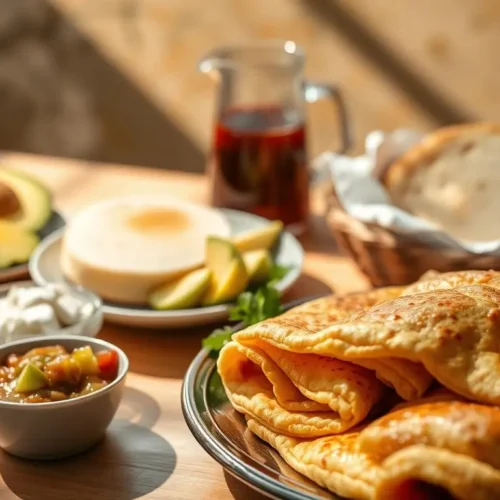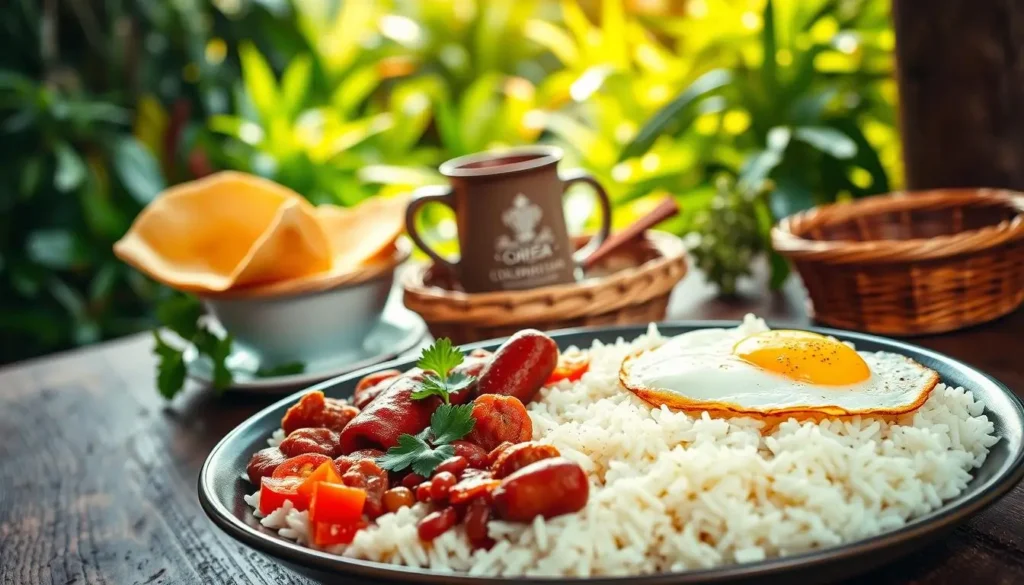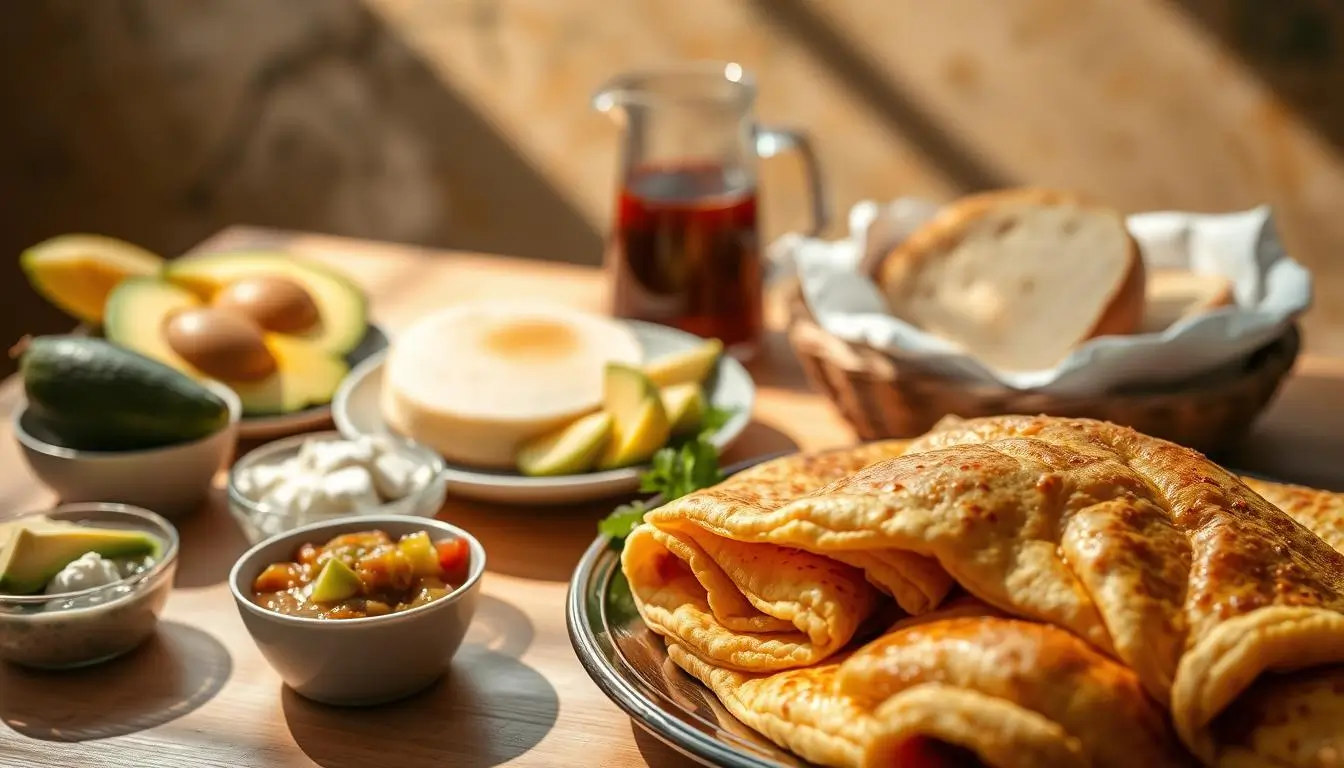Table of Contents
Growing up, I thought breakfast was just another meal. But my first trip to Colombia changed everything. The flavors, traditions, and hearty dishes I found were magical.
Colombian breakfast recipes is more than food. It’s a celebration of culture, family, and regional diversity. Each dish tells a story of local ingredients, cooking techniques, and shared meals.
From Cartagena’s street food to Bogotá’s mountain kitchens, these 10 recipes take you on a journey. Whether you love food or just want to try something new, get ready for a tasty morning adventure.
Key Takeaways
- Colombian breakfast celebrates regional culinary diversity
- Traditional recipes often feature hearty, savory ingredients
- Many dishes incorporate local produce and ancestral cooking methods
- Breakfast in Colombia is a social and cultural experience
- Each recipe reflects the unique character of its region
Introduction to Colombian Breakfast Culture
Colombian breakfast foods are more than just a morning meal. They are a rich cultural tradition that brings families together. They celebrate the diversity of the country, from the Andean mountains to the Caribbean coast.
What is a Colombian breakfast really about? It’s a lively experience that’s more than just food. It’s about connection, flavor, and community.
The Importance of Breakfast in Colombian Households
Breakfast is very special in Colombian culture. Families come together to enjoy:
- Fresh tropical fruits
- Homemade breads
- Traditional drinks like hot chocolate
- Savory dishes with protein
Regional Variations in Colombian Morning Meals
Each region in Colombia has its own breakfast traditions. This shows the country’s rich agriculture and cultural diversity.
| Region | Signature Breakfast Dish | Key Ingredients |
|---|---|---|
| Andean Region | Calentado | Rice, beans, meat |
| Caribbean Coast | Seafood Arepas | Corn, fresh seafood |
| Neiva | Tamal Huilense | Corn dough, meat |
Essential Ingredients in Colombian Breakfast Dishes
Key ingredients in Colombian breakfasts include:
- Corn – the base of many dishes
- Fresh eggs
- Queso fresco
- Tropical fruits
- Locally sourced meats
Each ingredient highlights Colombian agricultural traditions and regional tastes.

10 Traditional Colombian Breakfast Recipes
Equipment
- Large Skillet or Pan For cooking the calentado.
- Non-stick Pan For frying the eggs.
- Mixing Bowl For preparing the arepa dough.
- Griddle or Cast Iron Pan For cooking the arepas evenly.
- Wooden Spoon or Spatula For stirring and flipping.
- Measuring Cups & Spoons For accurate portioning.
- Cutting Board & Knife For chopping vegetables.
- Serving Plates For presenting the breakfast beautifully.
Ingredients
For the Calentado (Rice & Beans Mix):
- 2 cups cooked white rice leftover works best
- 1 cup cooked red or black beans drained
- 1 tablespoon olive oil
- ½ cup chopped onion
- ½ cup chopped tomatoes
- 1 teaspoon ground cumin
- ½ teaspoon salt
- ¼ teaspoon black pepper
- 1 teaspoon butter optional, for extra flavor
- 1 tablespoon fresh cilantro chopped (for garnish)
For the Arepas:
- 1 cup precooked cornmeal masarepa
- ½ teaspoon salt
- ¾ cup warm water
- 1 teaspoon butter or oil for cooking
For the Eggs:
- 4 large eggs
- 1 tablespoon butter or oil
- ¼ teaspoon salt
- ¼ teaspoon black pepper
For Serving (Optional):
- 1 ripe plantain sliced and fried
- ¼ cup queso fresco or grated cheese
- Avocado slices
Instructions
Step 1: Prepare the Calentado (Rice & Beans Mix)
- Heat olive oil in a skillet over medium heat.
- Add chopped onion and sauté for 3 minutes until softened.
- Stir in chopped tomatoes, cumin, salt, and black pepper. Cook for 2 minutes.
- Add cooked rice and beans, stirring well. Cook for 5-7 minutes until heated through.
- Stir in butter (optional) for extra flavor.
- Garnish with fresh cilantro and set aside.
Step 2: Make the Arepas
- In a bowl, mix precooked cornmeal (masarepa) with salt.
- Gradually add warm water, stirring until a dough forms. Let sit for 5 minutes.
- Knead the dough for 1-2 minutes, then divide into 4 equal portions.
- Flatten each portion into a 1/2-inch thick disc.
- Heat a skillet or griddle over medium heat and cook each arepa for 4-5 minutes per side until golden brown.
Step 3: Fry the Eggs
- Heat butter or oil in a non-stick pan over medium-low heat.
- Crack the eggs into the pan and cook until whites are set, about 2-3 minutes.
- Season with salt and pepper.
Step 4: Serve & Enjoy
- Plate the calentado, arepas, and fried eggs together.
- Add optional fried plantains, queso fresco, or avocado slices.
- Serve hot and enjoy a traditional Colombian breakfast!
Video
Notes
- Calories: ~580 kcal
- Protein: ~20g
- Carbohydrates: ~75g
- Fiber: ~10g
- Sugar: ~6g
- Fat: ~20g
- Saturated Fat: ~5g
- Sodium: ~500mg
- Potassium: ~700mg
Traditional Arepa Varieties for Breakfast
Arepas are the heart of Colombian breakfasts. They are more than just a side dish. With over 55 types in Colombia, they show a rich culinary tradition.
Colombian breakfast arepas come in many tasty varieties. Here are some favorites:
- Arepa con Queso: A classic breakfast favorite stuffed with melted cheese
- Arepa de Huevo: A more elaborate version filled with a whole egg
- Arepa Boyacense: A sweet and thick arepa from the Boyacá region
- Arepa de Choclo: A sweet corn arepa with a unique texture
Making these simple Colombian breakfast foods is quick and easy. Most homes make fresh arepas daily in 15-20 minutes. The dough is made from masarepa, salt, and water.
| Arepa Type | Preparation Time | Cooking Time |
|---|---|---|
| Arepa con Queso | 10 minutes | 6-8 minutes |
| Arepa de Huevo | 20 minutes | 15 minutes |
| Arepa de Choclo | 15 minutes | 10 minutes |
Pro tip: You can freeze arepas for up to a month in an airtight container. This is great for busy mornings or meal prep.
Colombian Breakfast Recipes: From Simple to Elaborate
Colombian cuisine has a wide range of easy breakfast recipes. They suit every taste and occasion. From quick morning dishes to big weekend meals, these recipes show Colombia’s rich food heritage.
The variety of Colombian breakfasts shows the country’s diverse regions and culture. Whether you want a simple arepa or a big family meal, there’s something for everyone.
Quick and Easy Morning Recipes
For quick mornings, try these simple Colombian breakfasts:
- Huevos Pericos: Scrambled eggs with tomatoes and onions
- Arepa con Quesito: Corn cake with fresh cheese
- Quick Empanadas
Special Occasion Breakfast Dishes
For special mornings, these healthy Colombian recipes impress:
- Bandeja Paisa: A hearty platter with many parts
- Traditional Tamales
- Elaborate Arepas with Multiple Toppings
Family-Style Breakfast Options
Colombian families turn leftovers into tasty morning meals. Calentado is a great example, mixing rice, beans, and meats from before.
| Dish | Preparation Time | Difficulty Level |
|---|---|---|
| Huevos Pericos | 10 minutes | Easy |
| Bandeja Paisa | 45 minutes | Advanced |
| Calentado | 15 minutes | Easy |
These recipes show how versatile and rich Colombian morning food is. They offer something tasty for every taste and event.
Huevos Pericos: The Perfect Colombian Scrambled Eggs
Huevos pericos are a favorite in Colombia for breakfast. They mix eggs, tomatoes, and scallions for a burst of flavor. This dish is a true taste of vibrant breakfasts.
This colombian breakfast recipe is quick and delicious. It only takes 15 minutes to make. The secret to great huevos pericos is in the prep work.
- 5 large eggs
- 2-3 finely chopped scallions
- 2 roma tomatoes, diced
- 1 tablespoon butter or olive oil
- Salt and pepper to taste
These eggs are not just tasty, they’re also good for you. Each serving has 186 calories, 13g of protein, and 10g of carbs. You can also add ham, bacon, or avocado slices for extra flavor.
Making huevos pericos is easy. First, sauté the scallions and tomatoes until they’re soft. Then, add the eggs and cook until creamy. Serve with arepas or farmer’s cheese for a real Colombian breakfast.
Here’s a tip: Make sure to chop your veggies finely. Cook them for 5-7 minutes to bring out their flavors. This way, your eggs will stay tender and tasty.
Hearty Breakfast Soups: Changua and Caldo de Costilla
Colombian breakfast soups are a special part of their tradition. They are warm, nourishing, and connect families through generations. These soups are more than just food; they are a cultural experience.
Colombian breakfast recipes include two amazing soups: changua and caldo de costilla. Each soup has its own story of flavors and traditions from different parts of Colombia.
Traditional Preparation Methods
Caldo de Costilla is a hearty soup that needs careful preparation. Here’s what you need:
- 3 pounds of short ribs
- 15 cups of water
- 1 teaspoon ground cumin
- 5 garlic cloves
- 1 cup diced onion
- 6 chopped scallions
- ½ cup fresh cilantro
- 1 pound potatoes, chunked
Regional Variations
Colombia’s regions have their own ways of making these soups. In Bogotá, changua is a light soup with eggs and milk. But in Cundinamarca, they love the rich caldo de costilla, known for curing hangovers.
Health Benefits
These soups are full of nutrients. A serving of caldo de costilla gives you:
- 51g protein
- 29g carbohydrates
- 26g total fat
- 1604mg potassium
Looking for comfort, flavor, or nutrition? These Colombian breakfast soups are a great way to start your day.
Calentado: The Ultimate Leftover Breakfast

Calentado is at the heart of Colombian breakfasts. It turns yesterday’s leftovers into a tasty morning meal. This dish shows how to be creative with simple ingredients, making a hearty and fulfilling dish.
Calentado is a favorite in Colombia. It mixes leftover rice, beans, and meat into a delicious breakfast. It shows the value of not wasting food and making something tasty.
- Key ingredients for calentado include:
- Leftover white rice
- Red or black beans
- Shredded meat
- Fried plantains
- Fresh arepa
- Fried egg
Making calentado is easy. Warm the leftover rice and beans in a skillet. Add some extra seasonings for flavor. Top it with a fried egg and serve with a crispy arepa for a true Colombian breakfast.
Almost 80% of Colombian restaurants worldwide serve calentado. It’s a hit, enjoyed from 6:30 to 8:00 AM. It gives a nutritious start with proteins, carbs, and flavors.
Looking to cut down on food waste or try real Colombian food? Calentado is a tasty way to do it. It turns leftovers into a memorable breakfast.
Sweet and Savory Colombian Breakfast Breads
Colombian breakfast pastries take you on a flavorful journey. They turn a simple morning into a feast of taste and culture. From the cheesy pan de bono to the crispy buñuelos, they add warmth and joy to your table.
Exploring Colombian breakfast recipes means diving into a world of breads. Each region adds its own special touch to these morning favorites.
Pan de Bono: A Cheesy Delight
Pan de bono is a key Colombian breakfast treat. Made from yuca flour, cheese, and egg, these small breads mix savory tastes perfectly. Here’s how they’re made:
- Mixing pre-cooked cornmeal with fresh cheese
- Adding eggs for a smooth dough
- Forming small round shapes
- Baking until golden at 450ºF
Buñuelos: Crispy and Irresistible
Buñuelos are another must-try in Colombian breakfasts. They come in round doughnut shapes or flat versions. Enjoyed during holidays, they need careful frying for their crispy outside.
Traditional Accompaniments
Colombian breakfasts are best with the right sides. These breads go great with:
- Hot chocolate
- Aguapanela
- Fresh cheese
- Strong Colombian coffee
Whether you love breakfast or exploring new foods, these Colombian pastries will take you to Colombia’s lively streets.
Traditional Colombian Tamales for Breakfast
Tamales are a key part of Colombian breakfasts. They are both hearty and delicious. These tasty bundles are filled with flavor and hold a special place in Colombian culture.
Making authentic Colombian tamales is a detailed process. Here’s what makes them unique:
- Prepared with masarepa (precooked corn meal)
- Wrapped in fragrant banana leaves
- Filled with chicken, pork, or vegetarian options
- Steamed to perfection for maximum flavor
Tamales are not only tasty but also nutritious. A single tamal has about 714 calories. This makes them a great choice for a filling breakfast. They also have 28g of protein and a mix of carbs and fats for balanced nutrition.
Colombian families often make tamales for big events like Christmas and New Year’s. They make big batches, around 24 tamales. These can be stored in the fridge for 3 days or frozen for a month. To reheat, steam for 30 minutes if refrigerated or 45 minutes if frozen.
For home cooks, a tip is to use fresh banana leaves. Take your time with the preparation. This will give you a true taste of Colombia’s breakfast traditions!
Colombian Hot Beverages for Breakfast
Hot beverages are key in a traditional Colombian breakfast. They add warmth and flavor to the start of the day. The colombian breakfast menu wouldn’t be complete without them.

Colombian hot beverages are more than drinks. They are a cultural tradition that brings people together. They connect generations and regions through food.
Chocolate Caliente: A Luxurious Morning Ritual
Chocolate caliente is a highlight of colombian breakfast recipes. It’s made with:
- 2 cups of milk
- 2 ¼ ounces of dark chocolate
- 1 ½ tablespoons of sugar
- Optional spices like cinnamon
This drink turns simple ingredients into a delicious treat. It has 417 calories per serving and is full of nutrients like calcium and iron.
Aguapanela: Sweet Liquid Comfort
Aguapanela is another favorite Colombian breakfast drink. It’s made by dissolving raw sugar cane in boiling water. This gives it a smoky caramel flavor.
- ¼ cup chopped panela
- ¾ cup boiling water
- Optional cheese pairing
Coffee Serving Customs
Coffee is a big part of Colombian culture. They serve small, strong cups called tinto all morning.
These drinks are the heart of Colombian breakfast. They bring warmth, nutrition, and connection to every morning.
Coastal Colombian Breakfast Specialties
Exploring traditional Colombian breakfast food, the coastal regions offer a unique culinary experience. My journey along the Caribbean coastline showed me a wide range of delicious dishes. These dishes truly capture the essence of coastal cuisine.
The coastal Colombian breakfast recipes mix indigenous and African influences. Seafood and tropical ingredients are key, making morning meals unforgettable. Locals love these dishes.
- Cayeye: A traditional green banana mash served with cheese and meat
- Carimañolas: Crispy yuca fritters filled with savory meat or cheese
- Patacones con queso: Fried plantains topped with melted cheese
- Arepa de huevo: A remarkable egg-stuffed arepa popular in coastal regions
If you’re looking for Colombian breakfast near you, these coastal specialties are a must-try. Street vendors along the Caribbean coast often serve these dishes. They are easy to find for both locals and travelers.
The variety of coastal breakfast options shows the region’s cultural richness. Each bite shares a story of tradition, innovation, and the unique flavors of Colombian coastal cuisine.
Essential Tools and Ingredients for Colombian Breakfast
Mastering Colombian breakfast recipes is more than just skill. It also needs the right tools and ingredients. I’ve found that the key to authentic flavors is understanding the essential tools and ingredients.
Traditional Cooking Equipment
To make authentic Colombian food, you’ll need specific kitchen tools:
- Chocolatera: A traditional metal pot for hot chocolate
- Cast-iron skillet: Great for cooking arepas and other breakfast items
- Arepa maker or griddle: For perfectly cooked corn cakes
- Manual coffee grinder: For freshly ground Colombian coffee beans
Where to Find Authentic Ingredients
Finding genuine Colombian breakfast ingredients is an adventure. You can find them at Latin American grocery stores, specialty markets, and online on Amazon. Look for key items like:
- Masarepa (pre-cooked corn flour)
- Panela (unrefined cane sugar)
- Colombian coffee beans
- Specific cheese varieties like queso fresco
Substitution Options
If you can’t find exact ingredients, don’t worry. Many items have substitutes that keep the flavor true:
- Regular cornmeal can replace masarepa (with slight texture adjustments)
- Brown sugar works as a panela alternative
- Mozzarella can substitute for traditional Colombian cheeses
- Regular milk can be used instead of coconut milk in some recipes
With these tools, ingredients, and substitution tips, you’re ready to make the vibrant flavors of Colombian breakfast in your kitchen!
Conclusion
Exploring traditional Colombian breakfast recipes has shown me a world beyond just breakfast. These dishes are more than food; they celebrate culture, family, and creativity. They turn simple ingredients into amazing experiences.
The arepa and calentado are just the start. Recipes like Huevos Pericos and Changua bring warmth and flavor to your morning. Colombian tamales show the depth and variety of breakfast in Colombia, making every day special.
Colombian breakfast is about more than eating. It’s about connecting with family and honoring traditions. These dishes carry wisdom from past generations, bringing people together. They show the beauty of Colombian food culture.
When you cook these recipes, you show love and respect for Colombian traditions. It’s not just about making food; it’s about sharing a story. Every bite is a part of a rich, ongoing narrative.

